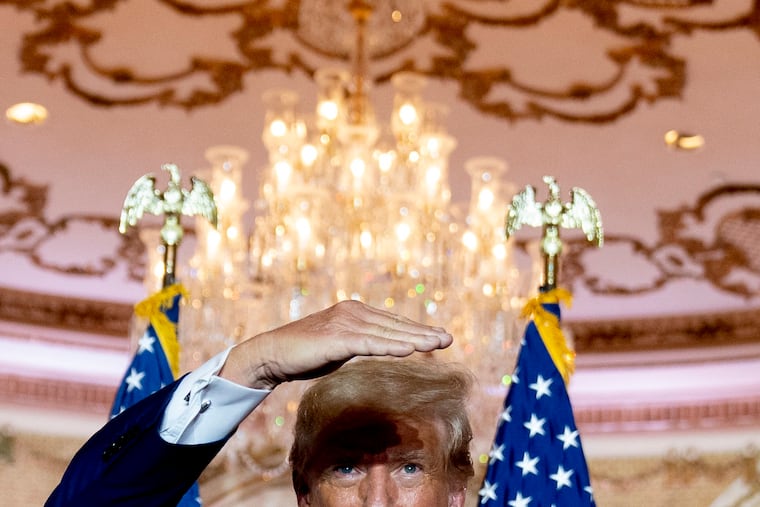After disappointing midterms, it’s time to dump Trump
Whatever good Trump did in years past is now far outweighed by the bad. The GOP must leave personality politics behind and run on the strength of its ideas.

Generals, it is said, are always fighting the last war. Political strategists are no different, and in our personality-focused modern politics, the effect can also be disastrous. Nowhere is that clearer than in the Republican midterm performance here in Pennsylvania.
After Ronald Reagan dominated the political scene of the 1980s, Republicans spent the next 35 years trying to find the next Reagan. The hero worship culminated in the Sept. 16, 2015, Republican primary debate at the Reagan Library. There, in the shadow of the great man’s grave, 14 candidates competed to prove which of them deserved to inherit his mantle.
A 15th candidate, Donald Trump, set out on a different path.
Instead of trying to recreate the past in a changed world, he tapped into voter frustrations about things that were happening in 2016, not 1980, and it worked. Trump won the nomination and the election by thinking differently and moving away from hero worship.
There’s an irony to that. Since Trump’s surprising and realigning 2016 victory, many in the Republican Party have continued the cult of personality, simply swapping idols. After Trump won, his refusal to genuflect to past Republican leaders could be seen as brilliant political insight. But before long, it became clear that he was just too arrogant to praise anyone but himself.
Now, six years after that shocking electoral triumph, Republicans have seen three straight disappointments, all caused by unthinking devotion to the 2016 Trump playbook. If it wasn’t clear before, it should be now: Whatever paradigm-shattering insight Trump may have had in 2016 worked only for that time and against that opponent. The same battle plans won’t work on a new field.
Moreover, they don’t work when they have been boiled down to their worst elements. Reagan Republicanism held sway for so long because it was based on ideas: smaller government, lower taxes, a strong national defense, and so on. Voters liked the man, but they also thought his ideas were what the nation needed at the time.
Trump did have some substance — trade protection, deregulation, originalist judges, and an anti-interventionist foreign policy — but his revolution was mostly about style. Little is left of the ideas as Trump’s “temporary” tariffs remain popular enough that President Joe Biden has kept them in place for nearly two years. The wars are over. The judges are seated. So what did Trump look for in a candidate when he made his endorsements? Nothing more than how much the person in question sucked up to him.
“Republicans entered the election season with the best conditions for victory in years.”
Republicans entered the election season with the best conditions for victory in years. A seriously unpopular president, a faltering economy, inflation like we haven’t seen in 40 years, continuing frustration with the declining quality of public education, and a Congress and president who did not seem willing or able to fix any of it. People were suffering and said they wanted change. Many pundits (including me) thought this environment was so toxic to Democrats that a rising Republican tide would lift all of their boats — even some of the leaky rust buckets that really weren’t seaworthy.
The stench of Jan. 6, 2021, was always going to taint Pennsylvania gubernatorial candidate Doug Mastriano’s campaign, but Republicans surveying the postelection landscape should see now how far down the ballot that malodor wafted. Two vulnerable Democratic incumbents in the 7th and 8th House Districts won reelection by 2% or less. The state House now hinges on a few suburban seats that will be decided by under a hundred votes. It is hard to say that weakness at the top of the ticket did not harm Republicans’ chances in these races.
Look at New York, where a strong challenge by Republican Lee Zeldin failed to take the governorship but had coattails enough to elect Republican House members in marginal districts. If the GOP does take the House, it will be because New York voted more Republican than it usually does. That is how good candidates can change a race.
Florida and Georgia are even more prominent examples. Both were swing states in 2020, like Pennsylvania, but both just reelected governors who focused on ideas and competence, not Trump and bizarre pronouncements. Ron DeSantis built coalitions and committed to the hard work of campaigning. He won by almost 20 percentage points and took counties like Palm Beach, which had not voted for a Republican governor since 1986. Mastriano touted endorsements from fringe figures, hardly ran any ads, and lost by almost 14 points.
Trump’s candidates underperformed across the country, but Pennsylvanians had front-row seats to the debacle. Perhaps more than any other state, we have seen that whatever good Trump did in years past is now far outweighed by the bad. It’s time for Pennsylvania Republicans to return to ideas, not personalities, and to work harder at picking candidates who are right for this state — not off-brand Trump clones.